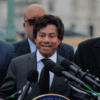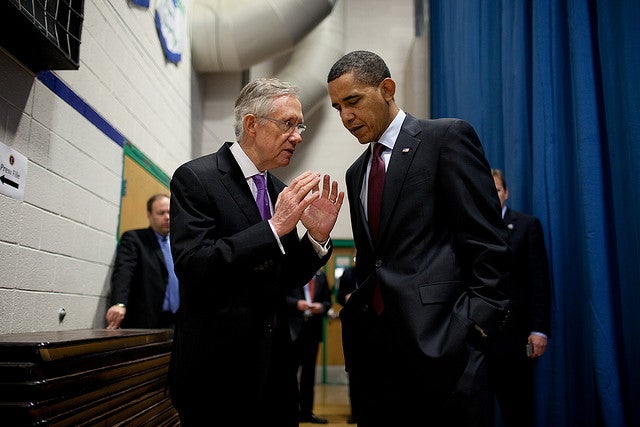Senate Republicans sought to answer President Obama’s demands for a vote on his jobs plan this afternoon, but were thwarted by Senate Majority Leader Harry Reid (D-NV), who used a parliamentary maneuver meant to block amendments on the Senate floor. Reid then proceeded to accuse Republicans of “obstruction” and engaging in a “political stunt.”
Reid used a procedural move known as “filling the tree” – a tactic Reid has perfected during his tenure in the Senate leadership. Filling the tree involves loading legislation with amendments until the limit is reached. Since the majority leader enjoys the right of first recognition – which means he can offer amendments before anyone else – Reid managed to fill the tree before Minority Leader Mitch McConnell (R-KY) could offer the president’s jobs plan as an amendment to a bill cracking down on Chinese currency manipulation.
McConnell said he would vote against the measure, but that the president is “entitled to a vote on his jobs bill.” With the president suggesting that Republicans were preventing consideration of the legislation, McConnell said, “I wanted to disabuse him of the notion that somehow we’re unwilling to vote on his proposal.”
Reid also confirmed during his floor debate with McConnell that Democrats would not present a unified front on the legislation – let alone capture the seven Republican votes needed for a filibuster-proof supermajority. “A majority of Democrats will support the president’s jobs bill,” Reid said, tacitly acknowledging that at least some would not.
Far from having notable support among the president’s party, Obama’s jobs bill has garnered no cosponsors in either the House or the Senate. Nonetheless, the president has on at least 12 occasions called on Congress to immediately pass the legislation – though Reid insisted that “’right away’ is a relative term” – and in some cases said that Republicans were blocking its consideration.
Obama’s 2012 campaign manager sent an email around the time Reid blocked consideration of the president’s plan. It had the subject line, “They won’t even vote on it.” That email mentioned House Majority Leader Eric Cantor, but not Reid.
The bill’s inability to gain traction even among members of the president’s own party stems from the unpopular nature of many of its proposals – and its accompanying offsets. “In the Administration’s poorly crafted and contradictory jobs package, the American people get permanent tax hikes that would enlarge the federal government to offset the cost of temporary jobs policies that would not create any jobs,” Heritage’s Curtis Dubay explained. “In the long run, the tax hikes in this plan are more likely to destroy more jobs than the jobs policies create.”
































12 Replies to “Reid Uses Procedural Maneuver to Block Vote on Obama’s Jobs Bill”